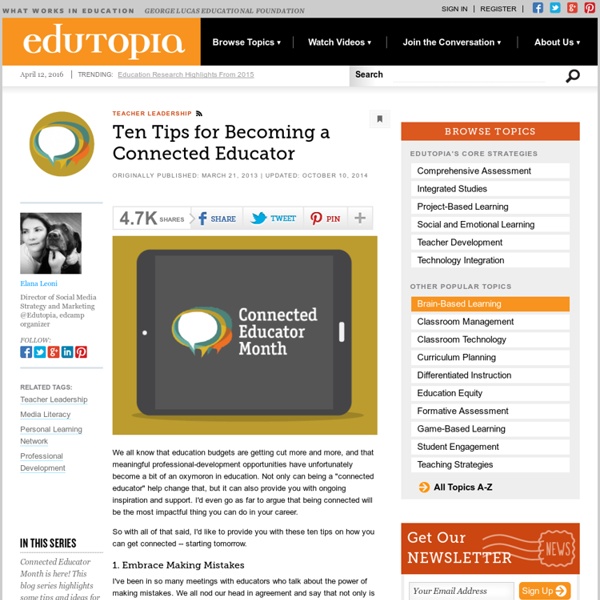Connectivism: A Learning Theory for the Digital Age
Connectivism: A Learning Theory for the Digital Age December 12, 2004 George Siemens Update (April 5, 2005): I've added a website to explore this concept at www.connectivism.ca Introduction Behaviorism, cognitivism, and constructivism are the three broad learning theories most often utilized in the creation of instructional environments. Learners as little as forty years ago would complete the required schooling and enter a career that would often last a lifetime. “One of the most persuasive factors is the shrinking half-life of knowledge. Some significant trends in learning: Many learners will move into a variety of different, possibly unrelated fields over the course of their lifetime. Background Driscoll (2000) defines learning as “a persisting change in human performance or performance potential…[which] must come about as a result of the learner’s experience and interaction with the world” (p.11). Driscoll (2000, p14-17) explores some of the complexities of defining learning. Conclusion:
Global Competence | Education
By Anthony Jackson In matters of national security, environmental sustainability, and economic development, what we do as a nation and in our everyday lives is inextricably intertwined with what governments, businesses, and individuals do beyond our borders. This new reality helps us more clearly define the role that education must play in preparing all students for success in an interconnected world. The United States have invested unprecedented resources in education, betting that our outmoded, factory-age system can be fundamentally transformed to prepare students for the rigors of a global economy. They have challenged states and school districts to set clearer, higher standards and assess student progress in more creative ways, prepare more productive teachers, and provide effective intervention in failing schools. These are necessary strategies for change, but insufficient to create the citizens, workers and leaders our nation needs in the 21st century. Investigate the World.
A review of research on the impact of professional learning communities on teaching practice and student learning
Abstract After an overview of the characteristics of professional learning communities (PLCs), this manuscript presents a review of 10 American studies and one English study on the impact of PLCs on teaching practices and student learning. Although, few studies move beyond self-reports of positive impact, a small number of empirical studies explore the impact on teaching practice and student learning. The collective results of these studies suggest that well-developed PLCs have positive impact on both teaching practice and student achievement. Implications of this research and suggestions for next steps in the efforts to document the impact of PLCs on teaching and learning are included. Keywords Professional development; School culture; Teaching practice; Student achievement; Teacher collaboration 1. Over the past 20 yr there has been a paradigm shift gathering momentum with regard to the professional development of teachers. 2. 3. The studies for our review come from two key sources.
Teachers Support Differentiated Learning Through Professional Development and Collaboration
Sometimes, y'all when we're researching we find out things that we think we knew already might not be exactly true. Is that okay? Yes. The teaching team at Forrest Lake is a tightknit group. Many of them have worked together for several years collaborating to improve their teaching skills and supporting each other as they embrace rapidly evolving technology. Alright, we need to look at home life. How they travel in transportation. Transportation. Yeah. Every other week grade-level teams meet in what they call "Collaborative Corner" to discuss challenges and plan interdisciplinary lessons together. Because we have plenty of resources on everything. Media specialist, Lizzie Padget. Do you like having the taste of the countries with everybody in a different room? And Curriculum Coordinator, Marian Scullion. The student will demonstrate an understanding of other settings across the world. We've used a number of different models over the years for staff development and training. Oh we can do that too.
The 7 Values That Drive IDEO
Collaboration/Cooperative Teaching/Teacher Tools/Types of Co-Teaching
Types of Co-Teaching What are the five types of co-teaching? Friend, Reising, and Cook (1993) identified five options teachers typically use when implementing a co-teaching model. As teams progress through these 5 types, it is important to remember these types are hierarchical across three variables. Lead and Support One teacher leads and another offers assistance and support to individuals or small groups. Station Teaching Students are divided into heterogeneous groups and work at classroom stations with each teacher. Parallel Teaching Teachers jointly plan instruction, but each may deliver it to half the class or small groups. Alternative Teaching One teacher works with a small group of students to pre-teach, re-teach, supplement, or enrich instruction, while the other teacher instructs the large group. Team Teaching Both teachers share the planning and instruction of students in a coordinated fashion.
How to Create Fruitful Co-Teaching Partnerships
A MiddleWeb Bog By now co-teachers around the nation have had a chance to get off on the right foot. I hope you had a flying start! Maybe even hit the ground running! The first goal for co-teachers is to pave the way for a successful year by establishing a learning environment that nurtures a sense of community. If you are working together by choice, it’s likely you are well into a good groove by now! A forced pairing can flourish This is the reality: most co-teachers find themselves together in the same classroom because somebody says they have to be. Some “forced pairings” rise to the occasion and decide to just make it work. My quest to elevate co-teaching has always been to find an antidote for the feelings of resignation that frequently emerge when co-teachers are forced into a relationship. Jim Knight’s partnership approach Jim Knight The Partnership Approach has seven core principles that deepen the awareness of collaboration. Co-Teaching with Knight’s Core Principles 1. 2. 3. 4. 5.



